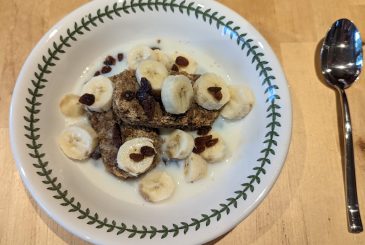These nutrition tips will help you max your performance on race day!
Whether you are racing on the water or indoors, what you eat – and when – should always be a key aspect of your race-day plan.
Turning up to the start-line fuelled, hydrated, and ready-and-raring to go is essential for good performance. Whether you are striving for a gold medal or to beat a personal best, this article will provide some tips about the best things to eat and drink prior to racing.
What type of foods should I be eating?
During a race, almost all your energy comes from carbohydrates. Carbohydrates are stored in the muscle and liver as glycogen; these can be considered as the battery stores in your body. As you compete, these batteries become depleted. If you do not fuel properly prior to a race, you run the risk of depleting your energy stores too early. This will leave you feeling fatigued and unable to compete to the best of your ability.
“At least one-third of your dinner plate should be made up of carbohydrates such as rice, quinoa, or potatoes”
When should I start the fuelling process?
Although it is not necessary to carbo-load for a 2km race, what you eat the day before will still impact on your performance.
Dinner should be a mixed meal containing plenty of carbohydrates, a fist-size portion of proteins, and a good serving of vegetables. As carbohydrate is an essential source of energy ahead of a rowing race, at least one-third of your dinner plate should be made up of carbohydrates such as rice, quinoa, or potatoes.
What should I eat on race day?
The three hours leading up to a race are a prime opportunity to fuel and hydrate appropriately. Here, it is important to strike the balance between fuelling enough, but not eating too much that you feel uncomfortable, and hydrating appropriately to support performance.
“Try to avoid high-fat foods such as heavy creams, cheese, and fatty meats; these take longer to digest”
Consuming between 1-2g of carbohydrate per kilogram of your body mass should be sufficient to fuel a 2km race. For example, a 65kg individual would need to consume between 65-130g of carbohydrates.
In general, pre-exercise meals should contain lower glycaemic index (GI) carbohydrates as they provide energy over a longer period of time. They can be found in foods such as oats, pasta (cooked al dente) and sweet potatoes.
Some individuals may choose to have an additional snack about one hour before racing. These snacks should be made up of simple carbohydrates to provide a quick release of energy.
Pre-race meals equivalent to 65g of carbohydrates
| Meal | Portion |
| Porridge with a small banana | 70g oats, 200ml semi-skimmed milk, 1 small banana |
| Muesli with Greek yoghurt, berries and banana | 70g muesli, 125g Greek yoghurt & 2 large handfuls of frozen berries, 1/2 a banana |
| Sweet potato with tuna | 1 medium sweet potato, 1 tin of tuna, 3 tbsp sweetcorn, 2 tsp mayonnaise |
| Chicken with basmati rice and vegetables | 1 chicken breast, 80g rice, 2 large handfuls of mixed vegetables |
Pre-race snacks equivalent to 30g of carbohydrates
| Snack | Portion |
| Fruit bread | 2 x 30g slices |
| Banana | 1 large banana |
| Cereal bar | 1 cereal bar that contains honey and oats |
| Scotch pancakes | 2 Scotch pancakes |
Is there anything I should avoid eating?
Stick to foods you are used to!
In addition, try to avoid high-fat foods such as heavy creams, cheese, and fatty meats; these take longer to digest and could cause gastrointestinal problems during the race.
The timing, composition and quantity of food tolerated before racing is very individualised. Training is the perfect opportunity to experiment with different meals and snacks and to practise race-day nutrition strategies. Once you find out what makes feel and train at your best, you can start to incorporate these into your race-day strategies.
What should I drink before a race?
As a rough guide, aim to have a minimum of two litres of fluid, or approximately 35ml/kg body weight, the day before a race. This can include water, fruit juice, squash, tea and coffee.
On the day of the race, try to have at least a pint of water when you wake up and again alongside your pre-race meal. Take small sips of water until the start of the race.
“What you eat the day before and three hours leading up to a race can have a significant impact on your performance”
What should I eat after a race?
What you eat after racing can accelerate muscle recovery and energy replenishment. The recovery process should start as soon as possible after finishing a race. This is particularly important if you have multiple races in one day or a race the following day.
Recovery meals and snacks should contain at least 20-40g of high-quality protein combined with a source of carbohydrate and plenty of vegetables. In addition, don’t forget to rehydrate; drink alongside recovery meals and snacks.
Great examples of post-race food include: flavoured milk, yoghurt with granola, scrambled eggs on toast and chicken stir-fries.
The bottom line
What you eat the day before and three hours leading up to a race can have a significant impact on your performance.
Carbohydrates are an important source of energy and should be the main component of pre-race meals and snacks. Accompany these with good hydration strategies to ensure that you are sufficiently fuelled and hydrated to perform at your best.
Best of luck on race day!










